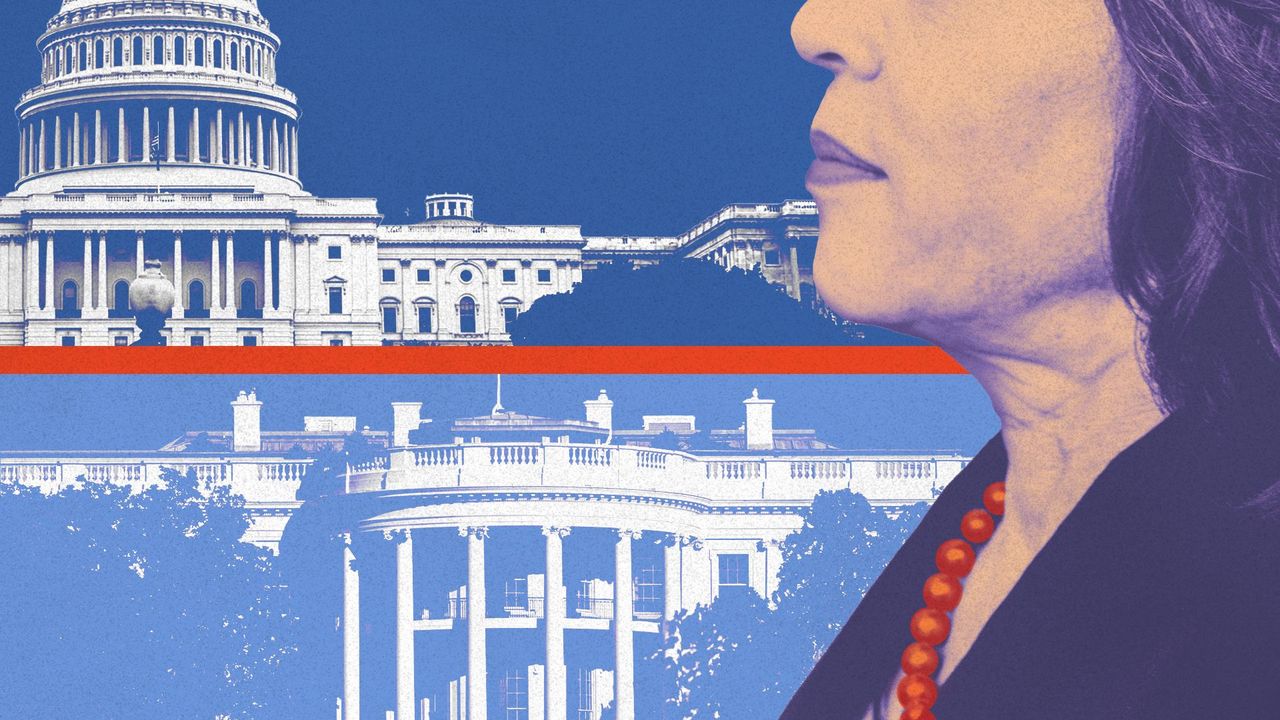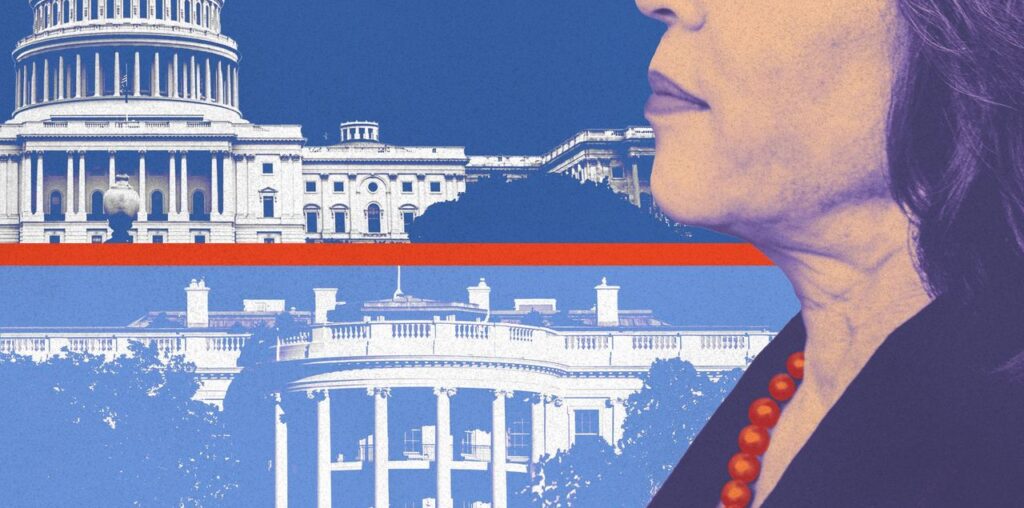
Second in a series
If Vice President Kamala Harris wins the election and Democrats flip the House and keep the Senate, the U.S. would witness a powerful resurgence of progressive policymaking across virtually every sector.
Why it matters: A fully Democrat-controlled Washington would protect President Biden’s legacy of vast domestic spending programs, including green-energy projects, and existing U.S. foreign policy.
- Democrats would race to make American courts less conservative, and hope for a Republican-appointed Supreme Court justice to retire.
This period of unified Democratic power would likely last two years, until the next congressional races — giving Democrats a rare window to advance ambitious reforms in the face of Republican opposition (including Senate filibusters).
- Democrats would be expected to move quickly on climate, health care and social justice reforms, and to reverse tax cuts for those making more than $400,000 a year.
- But big expansions would be tough: Even if Democrats defy expectations by keeping the Senate, a narrow majority may not be enough to override the filibuster on Harris’ top priorities.
The big picture: A private presentation by FGS Global — a communications and public affairs consultancy advising corporations on election outcomes — outlines potential policy shifts under a Harris administration that are fueled by a Democrat-controlled Congress. The firm’s analysis is based on a CIA method of anticipating, understanding and navigating geopolitical outcomes and risk.
- This is the second of four columns exploring the most likely election outcomes, combining our reporting with the FGS “Alternative Futures” analysis.
What to watch in FGS’ “progressive push” scenario, where Democrats control the White House, Senate and House:
1. Climate, environmental policy
Harris’ administration would put climate change at the forefront, with major legislation focused on reducing emissions and advancing green energy initiatives. Expect aggressive regulatory action to combat climate change, build out clean energy infrastructure, and create green jobs.
- Democrats would likely expand clean energy subsidies, providing incentives for solar, wind and electric vehicle adoption.
- A carbon border adjustment mechanism could be implemented, imposing tariffs on imports from countries with weaker environmental standards.
- Major investments in public transportation, electric vehicle infrastructure and energy-efficient housing would be on the horizon.
- Fossil fuels and carbon-dependent industries would face stricter regulations. That could disrupt the energy market, boosting renewables and potentially hurting traditional energy sectors like oil and gas.
- The U.S. would show stronger leadership on global climate agreements. But an aggressive environmental push could meet fierce opposition from industries facing higher compliance costs.
2. Health care, social spending
The Harris administration and a Democrat-controlled Congress would focus on expanding access to health care. You could expect legislation aimed at strengthening the Affordable Care Act (ACA), with particular emphasis on expanding Medicaid, and providing more robust subsidies for low- and middle-income Americans.
- Democrats would push to expand Medicare eligibility, possibly lowering age requirements and covering more services, including dental, vision care and home care for seniors.
- Federal investments in social safety nets — including child care, paid family leave and affordable housing — would be expanded to address growing inequality. Expect the child tax credit to be a top priority.
- Reproductive rights would likely be fortified, with the federal government defending access to abortion, contraception and gender-affirming care, especially in states that have passed restrictive laws.
- This push could lead to broader health care access for millions of Americans. But the cost could fuel a debate on higher taxes for corporations and wealthier households, which could stoke resistance from business.
3. Labor, economic policy
Expect an aggressive push on worker rights and corporate regulation. Democrats would likely focus on raising the federal minimum wage, increasing labor protections and expanding union rights across industries.
- Harris and Democrats could pass legislation that strengthens collective bargaining, making it easier for workers to unionize — especially in tech, health care and retail.
- There’d be renewed efforts to curb corporate power through anti-monopoly regulations, plus increased scrutiny on large tech companies and private equity firms.
- Tax policies would shift to focus on wealth redistribution, including higher taxes on the wealthy and corporations to pay for expansive social programs.
- These policies could lead to higher wages and greater labor protections for workers. But the proposals would likely create friction with corporations, especially in sectors heavily reliant on lower-wage labor.
- Progressive tax policies could redistribute wealth, but spark backlash from businesses and wealthy individuals facing higher tax burdens.
4. Education, social equity
Harris and a progressive Congress would likely focus on policies to advance racial and gender equity, in education and beyond. Expect initiatives aimed at closing the racial wealth gap, improving access to higher education and advancing LGBTQ+ rights.
- Democrats would push for student loan forgiveness, particularly for low-income borrowers, alongside expanded access to free community college and vocational training.
- Legislation would target systemic inequalities, with an emphasis on improving access to affordable housing and health care.
- Anti-discrimination policies would be strengthened, including federal protections for LGBTQ+ people, expanded gender equality measures and DEI programs in workplaces and schools.
- These moves could dramatically improve access to education and economic opportunities for historically marginalized groups, reducing inequality in housing, health care and employment. But cultural opposition from conservative states and communities could intensify, especially on LGBTQ+ rights and anti-racism education.
5. Judicial appointments, courts
With control over both chambers of Congress, Harris could appoint a new generation of progressive judges, shifting the federal judiciary leftward. Her administration would prioritize diversifying the courts, with a focus on civil rights, gender equality and environmental protection.
- Harris could reshape the judiciary, appointing judges supportive of expanding civil liberties and environmental protections.
- Potential Supreme Court nominations could reshape the balance of power on reproductive rights, voting rights and labor protection.
- This progressive judicial shift could safeguard Democratic policy gains for decades, particularly on civil rights and environmental issues. Conservatives would fight these appointments, which would threaten to overturn key legal precedents.
6. Foreign policy, global relations, immigration
Harris’ foreign policy would build on the multilateral approach championed by President Biden, bolstering American leadership on global climate goals and strengthening alliances like NATO.
- Democratic control of Congress would allow Harris to continue sending military aid to Ukraine. New weapons systems and a green light to strike deeper inside Russia could improve Kyiv’s leverage in peace negotiations, while also raising the risk of nuclear escalation.
- Harris has affirmed her ironclad support for Israel’s right to defend itself, but she’d face pressure from progressives to condition military aid or find other ways to end the regional war in the Middle East. Tensions are likely to run high with Israeli Prime Minister Benjamin Netanyahu.
- Harris would seek to rally U.S. allies to adopt a more hard-line approach toward China, which some experts fear could invade Taiwan as soon as 2027. She’d likely keep some tariffs on Chinese products and sanction human rights abusers, while also pursuing cooperation on areas of mutual interest like climate change and disrupting fentanyl supplies.
- After a years-long surge in migration, Harris has vowed to sign a bipartisan border bill that includes new restrictions on asylum. But with full control of Congress, Democrats would also push for broader reforms to the immigration system, like a pathway to citizenship for undocumented people brought to the U.S. as children.
Post-election risks: Trump and his allies have laid the groundwork for contesting the results of the election if they lose, preemptively spreading baseless claims of voter fraud. They’ve hired scores of lawyers, and are strategizing with friendly state officials on how to monitor elections and cry foul. Trump has a history of dismissing even election results confirmed by Republican officials.
- A sweeping progressive push could generate significant pushback in conservative-leaning states. If Harris won, especially in a close election, there could be attempts by Republican-controlled states to resist federal mandates, leading to legal battles over state versus federal authority.
- The polarization between red and blue states could deepen, with conservative states passing their own counter-legislation to defy federal laws on health care, abortion and LGBTQ+ rights.
- Conservative media and politicians would galvanize opposition, framing progressive policies as federal overreach, sparking protests and legal challenges.
The bottom line: This divide could create a fragmented policy landscape, where federal laws are met with state-level resistance, further polarizing the nation.
- Expect legal battles in the courts over the balance of power between state and federal governments, particularly on civil rights and health care.
Axios’ Zachary Basu contributed reporting.
- Go deeper: Harris’ “A New Way Forward” … First column in this series.
🗓️ Join Jim VandeHei, Mike Allen, and Eleanor Hawkins this Thursday for an Axios Communicators Pro virtual conversation about this series. You’ll hear how potential election outcomes will affect business — and what it means for communications leaders. Become a Comms Pro member to attend.

